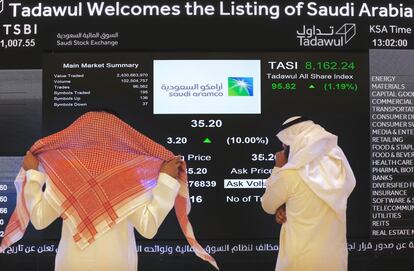The tentacles of Saudi money in the West: from telecom to electric cars, soccer and video games
The Public Investment Fund — Saudi Arabia’s sovereign wealth fund — is the vehicle that the Arab country utilizes to gain a foothold in multiple companies and diversify its income beyond oil

In recent years, there has been a Saudi invasion of Western companies taking place. This is by no means an improvised phenomenon. The periodic multi-billion-dollar disbursements by the country’s sovereign wealth fund — the all-powerful Public Investment Fund (PIF) — are part of an ambitious strategy that was born in 2016: the so-called Vision 2030. With it, the desert kingdom began the diversification of its economy, to reduce dependency on oil. Traditionally, Saudi progress has been based on its revenue from state-owned crude and refined oil. However, Riyadh’s ultimate goal is to increase the private sector’s contribution to Saudi GDP from 40% to 65% by the end of the decade.
The list of international companies – especially American ones – that have seen injections of Saudi capital overnight is very extensive. There are firms such as Lucid Motors — the Californian electric car manufacture — or Newcastle, the British soccer team. There are also video game giants, such as Electronic Arts and Activision Blizzard. And then, of course, there are household names that need no introduction such as Uber, Meta, Microsoft, or Starbucks, which now have big stakes owned by the PIF, which is controlled by the controversial Crown Prince Mohammed bin Salman (MBS). Since September 2022, MBS is also the regime’s prime minister.
In its annual report, the PIF claims to have $776 billion in assets under management. Over the past year, it increased this figure by 10%, with 25 new companies incorporated. Despite its massive stake beyond Saudi borders, the fund’s investments abroad still only represent a minority part of its portfolio: 23% of the total. In the report, the PIF highlights that its shares “include high-tech and high-growth sectors, such as video games and the creative industries in general, as well as companies and initiatives linked to the rapidly expanding travel and tourism industries.”
It’s difficult to find a relevant firm in Saudi Arabia where the PIF isn’t present. Aramco — the state-owned national oil conglomerate and one of the largest companies in the world — is an example of this. This past April, the sovereign fund doubled its stake to 8% of Aramco shares. In the case of Saudi Telecom (STC) — now in the spotlight in Spain, for acquiring 9.9% of Telefónica, the country’s largest telecom provider — the PIF has a majority stake of 64%.
The STC’s evolution on the stock market has been quite positive over the last five years. In that period, the Saudi firm — which sells mobile phones, internet, and TV packages — has accumulated shares in large Western operators, such as Vodafone, Orange, BT and Telefónica. This, subsequently, has paved the way for STC’s Arab peers to hunt for opportunities at a discounted price. For instance, the Emirati firm Etisalat bought 9.8% of the British multinational Vodafone for $4.2 billion in May 2022.
By no means have all of Saudi Arabia’s bets on Western companies been resounding successes. Luxury electric vehicle manufacturer Lucid Motors — which some saw as a future rival to Elon Musk’s Tesla — is disappointing shareholders with its poor sales data, resulting in a 60% dip in the stock market last year. The Saudi National Bank, meanwhile, squandered more than $1 billion in just five months on its doomed purchase of shares in the Swiss bank Credit Suisse. The PIF hoped to revive the flailing financial firm and make it profitable again, but it ended up being absorbed by its rival UBS at a bargain price, amid a massive withdrawal of deposits by its clients.
A sea of liquidity
These setbacks — among others — are, however, drops of water in the ocean of liquidity that the sovereign fund is swimming in. When there was a big push for renewable energies, many experts thought that the oil business was heading towards a slow decline. However, with the emergence of the pandemic — which caused demand to surge, given massive transportation costs — crude oil prices shot up on the international market. This allowed Saudi Arabia to emerge as one of the winners of the high inflation that’s currently suffocating Western households. According to the International Monetary Fund, in 2022, Saudi Arabia was the fastest growing economy in the G20, with a GDP increase of 8.7%. This was a reflection of “both strong oil production and non-oil GDP growth of 4.8 %, driven by robust private consumption and non-oil private investment, including megaprojects.”
This year, the successive production cuts announced by Saudi Arabia and Russia have reduced the global oil supply and pushed prices to annual highs, above $90 per barrel.
Once again, the inflationary threat is growing at the pumps, as is the enormous transfer of resources from consumers in oil-importing countries to oil-exporting countries. Drivers, heavy industries, agriculture, and all sectors that are in need of oil or its derivatives are adding to the wealth that Saudi Arabia is using to buy the companies and sports clubs in countries around the world.
Sign up for our weekly newsletter to get more English-language news coverage from EL PAÍS USA Edition
Tu suscripción se está usando en otro dispositivo
¿Quieres añadir otro usuario a tu suscripción?
Si continúas leyendo en este dispositivo, no se podrá leer en el otro.
FlechaTu suscripción se está usando en otro dispositivo y solo puedes acceder a EL PAÍS desde un dispositivo a la vez.
Si quieres compartir tu cuenta, cambia tu suscripción a la modalidad Premium, así podrás añadir otro usuario. Cada uno accederá con su propia cuenta de email, lo que os permitirá personalizar vuestra experiencia en EL PAÍS.
¿Tienes una suscripción de empresa? Accede aquí para contratar más cuentas.
En el caso de no saber quién está usando tu cuenta, te recomendamos cambiar tu contraseña aquí.
Si decides continuar compartiendo tu cuenta, este mensaje se mostrará en tu dispositivo y en el de la otra persona que está usando tu cuenta de forma indefinida, afectando a tu experiencia de lectura. Puedes consultar aquí los términos y condiciones de la suscripción digital.









































